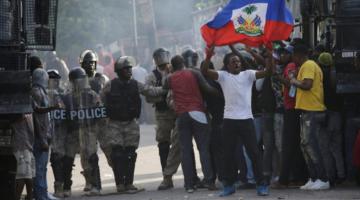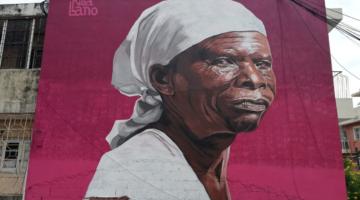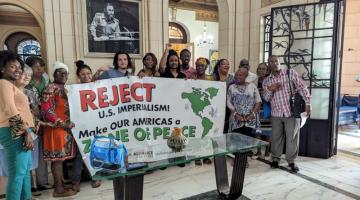In 1922 legal scholar Pierre Hudicourt argued that the US military occupation of Haiti was illegal. As Haiti enters the 20th year of another illegal occupation, Hudicourt’s analysis resonates powerfully.
The US military occupation of Haiti is illegal.
Such was the fundamental claim and critique made by Pierre Hudicourt in a 1922 address to a group of Americans in Washington, D.C. Yet for Hudicourt not only was the US occupation illegal — he argued that it blatantly contravened both national and international laws — but the illegality of the occupation enabled further illegal actions by the US against the Haitian people.
Under the cover of military rule, the US acted with gross impunity, trampling Haitian sovereignty, displaying a rank indifference to Haitian dignity, and turning the once-free and proud Republic into a cross between a plantation and a colony. Thus, onerous loans and odious debts were forced by Wall Street on to the Haitian government, martial law was imposed while press freedom suppressed, a puppet president beholden to the US was installed, peasant lands were expropriated by US sugar corporations, and the peasants themselves, who had long found in their land their dignity, identity, and livelihood, were transformed into “homeless itinerant day laborers” working for the lowest wages in the hemisphere. US actions while occupying Haiti represented the gross abrogations of law and demonstrated an absolute indifference on the part of both Washington and Wall Street to Haitian people.
Hudicourt was well-placed to comment on the illegality of the US occupation. A lawyer and legal scholar, Hudicourt had represented Haiti at the Second Peace Conference in 1907 in The Hague and had served the highest court in Haiti. He had protested the occupation since its origins in 1915, often traveling to the US and elsewhere to appeal for Haitian sovereignty on behalf of the Union Patriotique d'Haiti in their efforts to end the occupation. In 1923, Hudicourt attended the Fifth Pan-American Conference in Santiago de Chile alongside Manuel Morillo of the Dominican Republic. Together, they interrupted the polite, civil, and diplomatic proceedings of the conference, demanding justice for their respective countries, both under US military rule. (Hudicourt would later denounce Dominican president Joaquín Balaguer’s racist, anti-Haitian polemic La Isla al Revés: Haití y el Destino Dominicano, calling it “200 pages of insults to the dignity of the Haitian people.”) In the latter years of the occupation, Hudicourt advocated for the return of Haitian sovereignty via the Ligue d’Action Constitutionnelle.
Yet in 1922, when Hudicourt spoke at the Popular Government League luncheon in Washington, he perhaps could not anticipate that the US occupation would last for another next twelve years. While his address, published as “Haiti’s appeal to Americans,” asserted that the long-patient people of Haiti were on the verge of losing their patience, Hudicourt also expressed hope that US citizens would recognize something of themselves in Haiti, and Haiti’s historical struggle for independence and freedom, and demand that their government end the illegal occupation.
Today, Haiti is in the middle of yet another illegal occupation, also led by the US. We reprint Hudicourt’s appeal below. Will US citizens heed his historical appeal, and his warning that Haitian people “shall never abandon [their] determination to regain the freedom which is our birthright?”
HAITI’S APPEAL TO AMERICANS
Pierre Hudicourt
Mr. Chairman, ladies, and gentlemen, it is my privilege to express to-day before an American gathering the sentiments of the entire Haitian people toward the people of America. This sentiment is entirely one of confidence and friendliness. Living on the same hemisphere, having enjoyed, like you, the benefits derived from an independence conquered at the high price of prolonged suffering and bloodshed when we threw off the yoke, not of one, but of three Old World powers who were successively determined to keep us enslaved, the Haitian people have always had the same aspirations as yourselves and the same love of liberty and independence. Six and a half years ago [1915] this liberty, achieved by our forefathers not long after your own, was taken from us by the military forces of the United States.
Well, to date, the Haitian people have never held the American people responsible for the miseries inflicted by your military forces, acting, as we have always believed, under the inspiration of commercial and financial interests, and not authorized by the Congress of the United States. And it is for this reason that the Haitian people have not hesitated to appeal to what they still believe is the tradition and the heritage of your country. And in this connection a few words about our own history may be pertinent.
EARLY DANGERS NUMEROUS
The day after the proclamation of independence of the Republic of Haiti, on the 1st of January, 1804, our country, ravaged by 14 years of bitter struggle, was confronted with all kinds of financial difficulties, which seriously handicapped our economic development. We were in constant fear of invasion by France, and our difficulties with that country were only solved by the payment of the heavy indemnity of ninety million francs, the interest of which proved a heavy burden. For the following hundred years Haiti continued more or less isolated. Your country itself did not recognize our independence until the administration of that immortal friend of mankind, Abraham Lincoln. We had our internal dissensions and our revolutions, and candor compels me to admit that in a few years before the American occupation they were frequent. But, nevertheless, they were Haiti's own affairs, because in these disturbances no foreigners were ever injured. We are proud and happy to say that under Haitian governments no American life was ever lost. It is important to remember also that throughout all these years the Haitians scrupulously paid the interest on their external and internal debt; that is more than several of your own Southern States did. I think I am not mistaken that a number of them repudiated their financial obligation some years after your Civil War. Please always remember this when you hear talk of anarchy in Haiti.
PEOPLE PROTESTED AMERICAN ACTIONS
Now, whatever the conditions were in Haiti, the Haitian people are united in protesting that there was no justification for the landing and maintenance of American forces on Haitian soil since 1915; for the seizure by American marines of our custom-houses, and indeed of all our revenues; for the dissolution of our legislative bodies; for the use of coercive measures to force an unwelcome and undesired treaty upon the country; and to compel us to adopt a constitution by totally illegal means. Under Haitian civil law, and I am sure under American law, as indeed under law everywhere, an agreement between individuals is not binding unless the consent of both parties has been freely obtained. Three causes are recognized by jurisprudence as vitiating the consent, viz, violence, error, and fraud. If one of these causes exists the agreement is null and void. These same conditions which apply to a civil agreement are required also by international law for any international agreement. It is our contention and our belief, therefore, that the convention of 1915 which holds Haiti to-day is null and void, and should be so declared.
THE FACTS
It is not my desire or my purpose as a guest in your country to be critical of its actions. The facts themselves tell what has occurred; but I think I am justified in pointing out that these facts indicate that America's action in Haiti was contrary, first, to the formal agreement signed on the 18th of October, 1907, at the second Hague Peace Conference, of which Haiti is a signatory, relating to the necessary formalities which are to be carried out in case of a declaration of war, for America's acts against Haiti, while never so declared, were in reality acts of war.
Second, America's action was contrary to the formal agreement signed on October 18, 1907, at the second Hague Peace Conference, of which Haiti is also a signatory, relating to the peaceful settlement of international disputes.
Third, contrary to the special agreement entered into on the 7th of January, 1909, between the United States of America and Haiti, providing for the submission to the permanent court of arbitration established at The Hague by the convention of July 26, 1899, of all differences of a legal nature which may arise between the two countries.
Fourth, it is contrary to the entire spirit of the Monroe Doctrine, the first purpose of which was to defend the weaker nations of America from attack by the stronger.
America's action is contrary to the immortal principles laid down in the American Constitution, which constitutes for the present time the vade mecum of all democracies.
AMERICAN VIOLATION OF AMERICAN PRINCIPLES
America's action against Haiti's independence and sovereignty is contrary to the decisions of America's Supreme Court, based upon certain fundamental principles of international law, as set forth in the declaration of the Rights and Duties of nations adopted by the American Institute of International Law on January 6, 1916, as follows:
1. Every nation has the right to exist and to protect and to conserve its existence; but this right neither implies the right nor justifies the act of the State to protect itself or to conserve its existence by the commission of unlawful acts against innocent and unoffending States.
2. Every nation has the right to independence in the sense that it has a right to the pursuit of happiness and is free to develop itself without interference or control from other States, provided that in so doing it does not interfere with or violate the right of other States.
3. Every nation is, in law and before law, the equal of every other nation belonging to the society of nations, and all nations have the right to claim and, according to the Declaration of Independence of the United States, "to assume among the powers of the earth the separate and equal station to which the laws of nature and of nature's God entitle them."
4. Every nation has the right to territory within defined boundaries and to exercise exclusive jurisdiction over its territories and all persons, whether native or foreign, found therein.
5. Every nation has the right to territory within defined tories and all persons, whether native or foreign, found therein. 5. Every nation entitled to a right by the law of nations is entitled to have that right respected and protected by all other nations, for right and duty are correlative, and the right of one is the duty of all to observe.
6. International law is at one and the same time both national and international; national in the same sense that it is the law of the land and applicable as surely to the decision of all questions involving its principles; international in that sense that it is the law of the Society of Nations, and applicable as surely to all questions between and among the members of the society of nations involving its principles.
DOUBTFUL GOOD FAITH OF DECLARATIONS
Now, what are the motives behind the American occupation? Not being in touch with the State Department and the Navy Department of your country, I cannot say. The treaty which was imposed upon Haiti against its will specifically states: “That the United States has no aim except to insure, establish, and help maintain Haitian independence and the establishment of a firm and stable government by the Haitian people.”
Well, gentlemen, to date there has not been the slightest evidence in Haiti of any such purpose. Not only has the United States failed to carry out a single provision of the treaty which it composed and imposed, but every move has been contrary to Haiti's interests, contrary to the fundamental ideas of democratic government, and designed apparently merely to aid American investors. If it were the intention of the United States to "aid the establishment of a firm and stable government" by the Haitian people, why did the United States dissolve and abolish all forms of representative government in our country? Does anyone here think that the Haitian people would be aided by holding them under martial law, by preventing elections, and by giving us every day visible proof of the utter contempt at the hands of its military and civil officials? Indeed, an election of a president under the constitution which was written for us, according to his own boast, by Franklin Roosevelt, has been due, but by orders of the Marine Corps no such election has been held. The president who has been elected with the assistance of the Marine Corps should end his term next May, and no one in Haiti to-day among the Haitians knows whether and no one in Haiti to-day among the Haitians knows whether it is the purpose of your Government illegally to extend his term, illegally to appoint another president to office, or, indeed, has the slightest inkling of what the future holds.
AMERICANS SEEK CHEAP LABOR
We are a conquered and helpless people. The United States has abolished every real form of self-government. The president himself is a mere figurehead, a device of the occupation to give an appearance of legality and of democratic sanction to its own acts. We are at the mercy of the arbitrary acts of every marine private, of every small civil official. We have neither recourse in law nor the right of appeal, even to higher authorities in the United States. Why do the American interests want Haiti? For one thing, labor is cheaper there than almost any other place on earth. It can be obtained for the sum of 20 cents a day, a fact enthusiastically boasted of in a recent prospectus of the Haitian-American Sugar Co., when it was trying to float a loan in the United States. This prospectus pointed out that the average daily wage in Cuba was $1.75; in Haiti, 20 cents. The president of the United West Indies Corporation, another large American development company, which has acquired vast tracts of land since the Franklin Roosevelt constitution permitted strangers to acquire it, testified recently before the senatorial commission of inquiry: “We would not invest capital in Haiti if we could only get 9 or 10 per cent out of it. We believe that the prospects for investment of capital in Haiti are far in excess of 10 per cent.”
Now, what are these development companies doing and planning to do? They are planning by one means or another to push the little Haitian landowner off his land, the land that he has held and cultivated from father to son since our war of independence, when the great slave-holding estates were distributed among the peasants.
Having deprived them of their land, they will force these people, who have always been happy and contented, who by virtue of having a little piece of land all their own, have never known want-to force these people, I say, to become homeless itinerant day laborers, working at the glorious wage of 20 cents a day in the seasons when work is provided-that is to say, for only six months out of the twelve. During the other six months, robbed of their little property, God knows what they will do. You will, therefore, you who have supposedly come to help us, have introduced the American wage system and American unemployment in Haiti.
HAITI OPPOSES PROPOSED LOAN
In this connection I want to say a final word on a matter which I consider of paramount importance in obtaining a just settlement of the Haitian situation. While a senatorial commission of investigation was still on its way to Haiti on what purported to be the first serious investigation of the events of the last six years, and while a resolution, I am happy to say, has been introduced by Senator King, of Utah, who was formerly a member of that commission, calling for the withdrawal of the American occupation and the abrogation of the treaty which gives America complete financial control of the island, the American occupation is negotiating with American bankers for a large loan with Haiti. Under the terms of this loan, which is made subject to the convention of 1915, the Haitian finances will be subject to American control for thirty years. I think I may say that it is the hope of those Americans who desire to perpetuate the American hold on Haiti to have this loan an accomplished fact at the earliest possible moment, so that the question of abrogation of the treaty will be still further complicated. Haiti does not want this loan. Haiti does not need this loan. But in any event I desire to protest emphatically against the consummation of that loan while the entire Haitian question is sub judice. The Haitians desire the immediate return of their independence and sovereignty. Let them, then, if they feel that they need a loan, negotiate it freely upon such terms as they are able to secure. If the free Haitian Government should be willing to pledge a certain part of its revenues against such a loan, it can do so. But the loan now contemplated, like every other action based upon the illegal occupation, we repudiate in principle, and we object to it vehemently as an attempt to perpetuate the conditions which now exist. To these conditions the Haitian people will never consent. We have been a patient people. We have waited for six years in the hope and belief that the United States would render justice. We have not yet abandoned that hope, and we shall never abandon our determination to regain the freedom which is our birthright.
THE McCORMICK COMMISSION
Now, finally, I want to protest with all the emphasis of which I am capable, in the name of your own immortal principles, against the decision rendered recently by a senatorial commission which went to Haiti supposedly to investigate conditions there. That commission had spent some weeks in the United States listening to the testimony of marine officers and bankers interested in Haiti. When it came to hear the Haitian side, to hear the story of six years of tyranny, it spent actually only five days on the island, of which but one and a half was devoted to taking testimony. The rest of that time was largely spent in the company of the Marine Corps and of American investors.
Immediately on its return, although the commission had announced in Haiti that the case was by no means closed and that hearings would continue, it rendered a decision in a preliminary report. This report recommended that the marines stay in Haiti; that there be no abrogation of the convention; that a high commissioner, who would be a virtual dictator, should coordinate the various civil and military functions; and that the loan must be put through at once. Now, if this is "the establishment of a firm and stable government by the Haitian people," I leave it to your sober judgment. For my part, if the United States desires to annex Haiti, to make it an American colony, of which America's every single act affords convincing evidence, why not say so? Why continue the sham and the hypocrisy of pretending, against the will of the entire Haitian people, that you are there for philanthropic reasons? As I said, the Haitian people have been a patient people. They are a good and kindly people. But once they lose all hope in the honor of the United States I do not know what may ensue. I ask those of you who believe in the rights of liberty and independence for small countries what your course would be?
Pierre Hudicourt, “Haiti’s Appeal to Americans,” Advocate of Peace through Justice 84 no. 3 (March, 1922), pages 95-97.



















